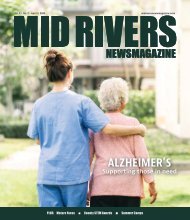West Newsmagazine 12-16-20
Local news, local politics and community events for West St. Louis County Missouri.
Local news, local politics and community events for West St. Louis County Missouri.
Create successful ePaper yourself
Turn your PDF publications into a flip-book with our unique Google optimized e-Paper software.
48 I HEALTH I<br />
December <strong>16</strong>, <strong>20</strong><strong>20</strong><br />
WEST NEWSMAGAZINE<br />
@WESTNEWSMAG<br />
WESTNEWSMAGAZINE.COM<br />
The Experts in Finding the Right Senior Living Community, For FREE!<br />
Sharon Balleau<br />
Senior Care Advisor<br />
Transitions For Senior Living has done the legwork of local Assisted, Skilled Nursing and Independent Living<br />
Communities, and can simplify your search. We understand the differences in care levels and take the time to<br />
explain those differences; so you can make the best decision.<br />
We personally evaluate your physical, cognitive and social care needs, narrow down your choices to the best 3<br />
to 5 options and accompany you on tours of communities...Completely Free Of Charge!<br />
Whether you are in a crisis or planning ahead, give us a call. We are a local, family-owned service.<br />
Personalized Service, because every situation is unique!<br />
(314) 606-8531 | www.STLsenior.com<br />
A recent survey found that young adults who may be kept apart from their<br />
families this holiday season are feeling high levels of anxiety. (Source: Adobe Stock)<br />
Health<br />
Capsules<br />
By LISA RUSSELL<br />
Holiday stress coming from<br />
a different source this year<br />
The rush of holiday activities that are an<br />
annual source of anxiety for most people<br />
– shopping, baking, parties, cleaning, giftwrapping<br />
and more – has been replaced<br />
by a different type of stress this year: the<br />
fear of getting COVID-19 or giving it to<br />
someone you care about. According to a<br />
Kaiser Family Foundation health-tracking<br />
poll conducted in October, two-thirds of<br />
Americans are worried they or their family<br />
members will get the virus.<br />
That stress is perhaps being felt most keenly<br />
among younger adults, many of whom live<br />
away from home and are facing the cold reality<br />
of celebrating the holiday season alone<br />
for the first time. A recent CDC Household<br />
Pulse Survey shows that those between the<br />
ages of 18 and 29 report the highest levels<br />
of anxiety and depression symptoms of any<br />
age group; between Sept. 30 and Oct. <strong>12</strong>,<br />
the latest survey dates available, nearly half<br />
reported symptoms of one or both conditions.<br />
However, young people won’t have a<br />
monopoly on anxiety this holiday season.<br />
For many others, too, the loss of the<br />
gatherings and traditions surrounding the<br />
holidays will undoubtedly increase depression<br />
and cause extra stress on top of what<br />
has already been a very anxiety-inducing<br />
year. The National Alliance on Mental Illness<br />
(NAMI) offers a number of commonsense<br />
tips to help keep prevent unhealthy<br />
levels of stress this holiday season:<br />
• Stay active. Physical activity can boost<br />
your mood, both in the short and long term.<br />
Even a 10-15 minute walk can help when<br />
you feel anxious or sad.<br />
• Address loneliness. Make an effort to<br />
call, text or video chat with those who are<br />
important to you. Staying occupied every<br />
As the drug addiction crisis continues throughout Missouri,<br />
the state is set to receive $25 million in funding from the Substance<br />
Abuse and Mental Health Services Administration in<br />
each of the next two years. That total will include nearly $2.8<br />
million for the University of Missouri – St. Louis. These funds<br />
will help in a number of fronts in the battle against addiction and<br />
overdose, according to Associate Research Professor Rachel<br />
Winograd, who leads the addiction science team at UMSL’s<br />
Missouri Institute of Mental Health.<br />
While much of the money will be used to obtain doses of the<br />
opioid overdose-reversing medication naloxone and to hire the<br />
personnel required to distribute it effectively, the new funding<br />
will also enable more focus on the rising problem of stimulant<br />
use, mainly methamphetamine and cocaine, Winograd said.<br />
“These are not strictly opioid grants anymore, which is good<br />
because most people who use opioids don’t only use opioids,”<br />
Winograd said. “This is a poly-drug overdose crisis, not just an<br />
opioid overdose crisis.”<br />
day is also helpful – an occupied and<br />
engaged mind is less likely to dwell on<br />
feelings of loneliness and sadness.<br />
• Eat and drink well. Food impacts<br />
mood, so make sure to eat healthy most of<br />
the time and watch your intake of holiday<br />
treats. Also remember that while alcohol<br />
might lift your mood and reduce stress in<br />
the moment, it actually increases anxiety<br />
and depression over the long term.<br />
• Get enough sleep. Sleep deprivation<br />
can heighten negative emotions and cause<br />
unnecessary added stress.<br />
• Keep expectations realistic. Not everyone<br />
is on the same page when it comes to<br />
COVID-19 … and these differences have<br />
the potential to cause disappointment and<br />
disagreements. Have a clear and frank discussion<br />
with family up front.<br />
Wash U study identifies potential<br />
early COVID-19 treatment<br />
Scientists worldwide have been searching<br />
diligently for possible COVID-19<br />
treatments that could be given in the<br />
virus’ early stages, to prevent people from<br />
becoming more seriously ill. A research<br />
team at Washington University in St. Louis<br />
has identified one drug that may help to<br />
meet this urgent need: the serotonin reuptake<br />
inhibitor (SSRI) fluvoxamine.<br />
UMSL team awarded new funding to combat ‘poly-drug’ overdose crisis<br />
Sold under the brand name Luvox among<br />
others, fluvoxamine is an antidepressant<br />
which has been prescribed since the mid-<br />
1990s, and is used primarily to treat those<br />
with obsessive-compulsive disorder. In<br />
a preliminary study conducted between<br />
April and August in the St. Louis area, the<br />
Wash U scientists found that fluvoxamine<br />
seems to prevent some of the most serious<br />
COVID-19 complications and make hospitalization,<br />
along with the need for supplemental<br />
oxygen, less likely.<br />
During this “contactless” study, 152<br />
patients with mild to moderate COVID-19<br />
who were attempting to recover at home<br />
received either fluvoxamine or a placebo<br />
along with monitoring supplies.<br />
After 15 days, none of the 80 patients<br />
who received fluvoxamine experienced<br />
serious worsening of their symptoms.<br />
Meanwhile, six of the 72 patients given the<br />
placebo (8.3%) became seriously ill, with<br />
four needing to be hospitalized.<br />
“Most investigational treatments for<br />
COVID-19 have been aimed at the very<br />
sickest patients, but it’s also important to<br />
find therapies that prevent patients from<br />
getting sick enough to require supplemental<br />
oxygen or to have to go to the hospital.<br />
Our study suggests fluvoxamine may help<br />
fill that niche.” said Dr. Eric Lenze of the<br />
Wash University School of Medicine.<br />
To help address prevention, for example, the Missouri<br />
Institute of Mental Health is partnering with Big Brothers<br />
Big Sisters for the first time. It has added a partnership with<br />
local nonprofit The T, a St. Louis area health education and<br />
resource center. Some funding will also support expansion of<br />
the Behavioral Health Network of Greater St. Louis’ EPICC<br />
project – Engaging Patients in Care Coordination – which connects<br />
people who have recently survived an overdose to treatment<br />
and recovery resources.<br />
Winograd added that the COVID-19 pandemic has also<br />
increased the challenge for combatting the drug crisis. It has disrupted<br />
supplies, making these dangerous drugs even more volatile<br />
and unpredictable. It also has increased the stress and feelings<br />
of anxiety that can lead people to begin using drugs in the first<br />
place, while creating more barriers for people seeking treatment.<br />
“People are getting left behind, and it’s not any specific entity’s<br />
fault,” she said. “It’s just the reality of how our society is<br />
structured and our society’s response to this pandemic.”

















